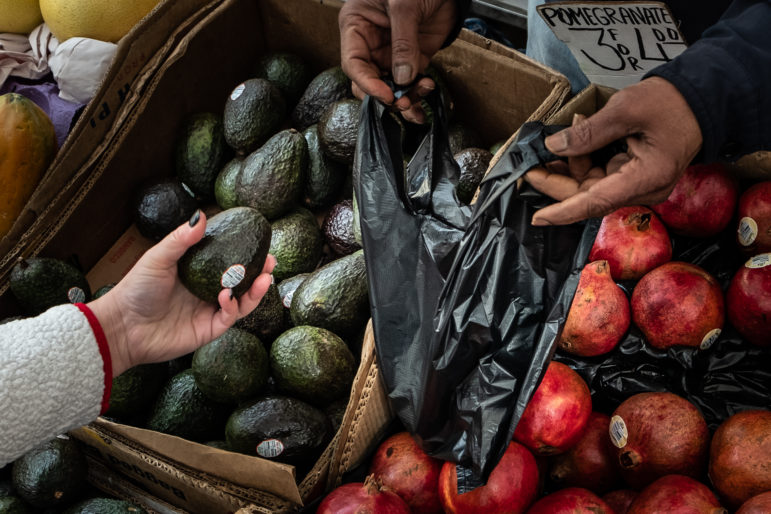In the first quarter of this year, the city’s Department of Consumer and Worker Protection (DCWP) issued 414 tickets to street vendors. The agency is no longer leading vendor enforcement as of April 1, when the Department of Sanitation took over.

Adi Talwar
Lea la versión en español aquí.
After a two-year tenure at the helm, the Department of Consumer and Worker Protection (DCWP) ended its role as the civilian enforcement agency for street vendors in the city on March 31. Starting April 1, the Department of Sanitation (DSNY) took over the reins, part of Mayor Eric Adams’ latest shift toward stricter enforcement of unregulated vending.
When news of the change came to light, street vendors and their advocates criticized City Hall’s decision, saying it could further penalize vendors, who saw an uptick in tickets in 2022, with the NYPD issuing significantly more violations than any other agency, despite longtime calls to remove police from the process.
During a City Council hearing at the end of March, DCWP’s commissioner Vilda Vera Mayuga suggested the agency wasn’t equipped to enforce street vending, citing operational challenges such as not receiving identification from vendors, and in some cases, facing aggression and violence.
DCWP officials reported issuing 3,300 vendor violations in 2022. But only 1,804 of those summons were officially recorded; inspectors were unable to issue the remainder because vendors refused to give their name and identification. “DCWP is a purely civilian agency,” DCWP Spokesperson Michael Lanza told City Limits.
“DCWP inspectors are civilians and cannot compel individuals to provide ID,” Laza continued. “Inspectors cannot issue a summons to an individual who does not provide ID.”
In the first quarter of this year—DCWP’s last at the helm—the department issued 414 tickets to street vendors, up from the same quarter last year, when it doled out 352. The top five most-ticketed zip codes this quarter included working-class and immigrant neighborhoods of Mott Haven and Jackson Heights, as well as Tribeca, Hell’s Kitchen/Times Square, and the Upper West Side in the 50s.
| Top Zip Codes for Complaints | # of Complaints | Top Zip Codes for Inspections | # of Inspections | Top Zip Codes for Tickets | # of Tickets |
| 10036 | 120 | 10455 | 108 | 10036 | 46 |
| 10004 | 90 | 11372 | 104 | 11372 | 29 |
| 11372 | 88 | 11220 | 75 | 10019 | 19 |
| 10035 | 75 | 10036 | 71 | 10013 | 17 |
| 10019 | 68 | 11368 | 57 | 10455 | 17 |
“We’ve seen this pattern before,” said Mohamed Attia, director of the Street Vendor Project (SVP), referring to increased enforcement seen in immigrant communities over the past few years, as previously reported by City Limits.
The most inspected zip codes during the last three months included neighborhoods in Mott Haven, Jackson Heights, Sunset Park, and Corona, which together accounted for 27 percent of all inspections this year (1,276). Hell’s Kitchen/Times Square also topped the list.
As the department has stated before, DCWP said that they conduct inspections in areas where vendors frequently operate, and in response to complaints received. But in Mott Haven’s case, the 10455 zip code only received two complaints in the first quarter of the year, but was inspected 118 times, accounting for nearly half of all Bronx inspections this quarter.
DCWP explained that the neighborhood Business Improvement District (BID) and Community Board submitted complaints directly to the agency regarding vending in the area around Third Avenue and 149th Street known as “The Hub,” so they inspected it weekly.
“Street vending, both compliant and non compliant, [has] created public safety, congestion, sidewalk, and economic development impact on brick and mortar retailers,” Third Avenue BID CEO Michael Brady told City Limits, calling the city’s vending regulations system “broken.”
“Street vendor sitting, the license and permit process, developing a sustainable plan to share in the tax burden, and a pipeline to move street vendors into brick and mortar stores is lacking in New York City,” he said. “It has evolved with honest vendors doing right for themselves and the city and other vendors which are predatory and using street vending as a front for illicit drug sale and moving stolen goods.”
Attia, who leads the largest vendor organization in the city with about 2,900 members, said that the argument about drugs and sales of stolen goods has been used for years to de-legitimize and stigmatize vendors, but in his experience, it is rare.
Vendors who operate without a proper permit, he said, are forced to do so thanks to a cap on the number of those permits kept in place for decades; the city is expected to issue the first new batch of licenses sometime this year, though the plan is behind schedule.
“The only ‘unlawful’ thing they’re doing is not having the required permit, because they can’t access one,” Attia said.




